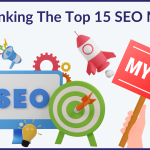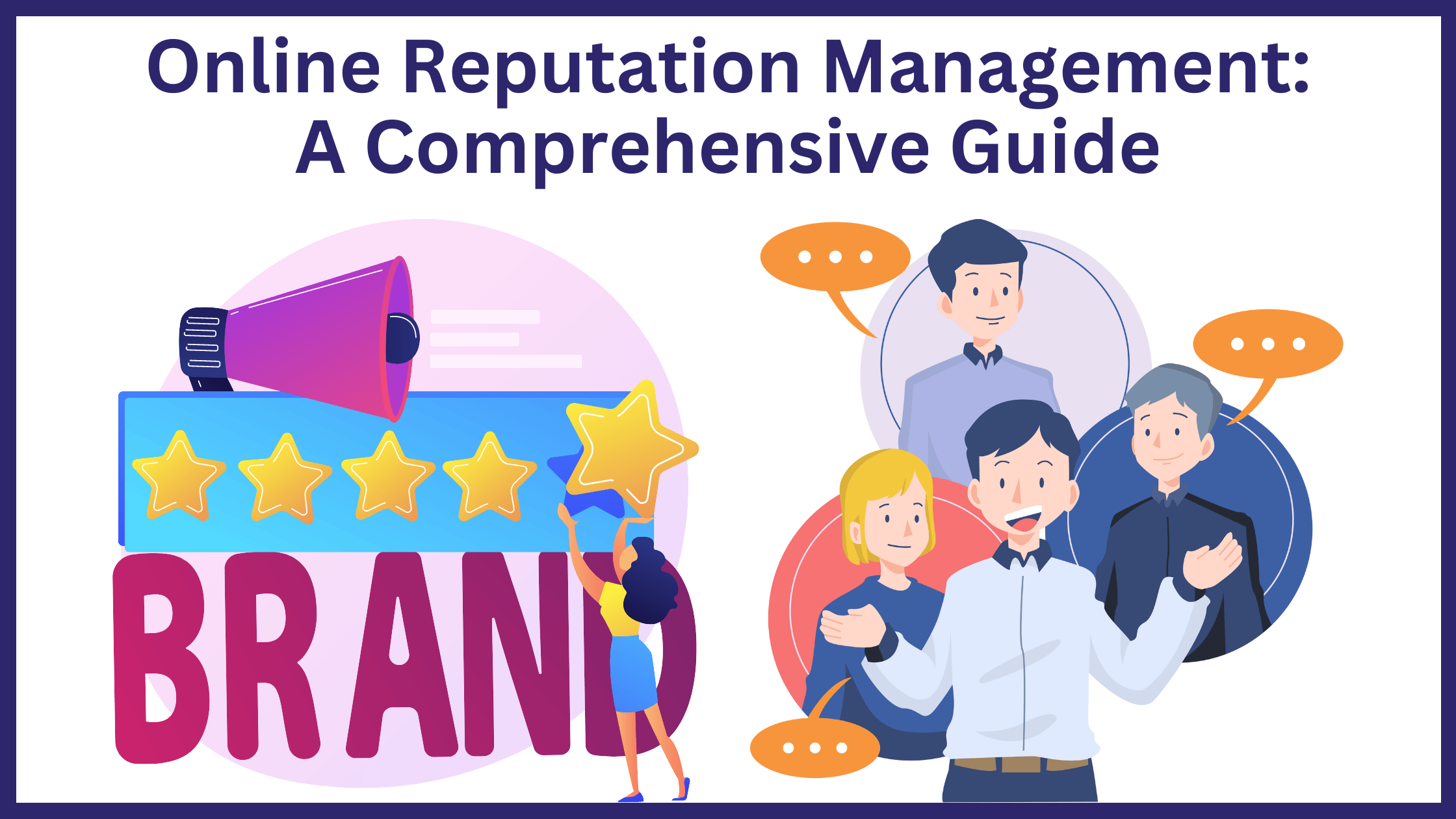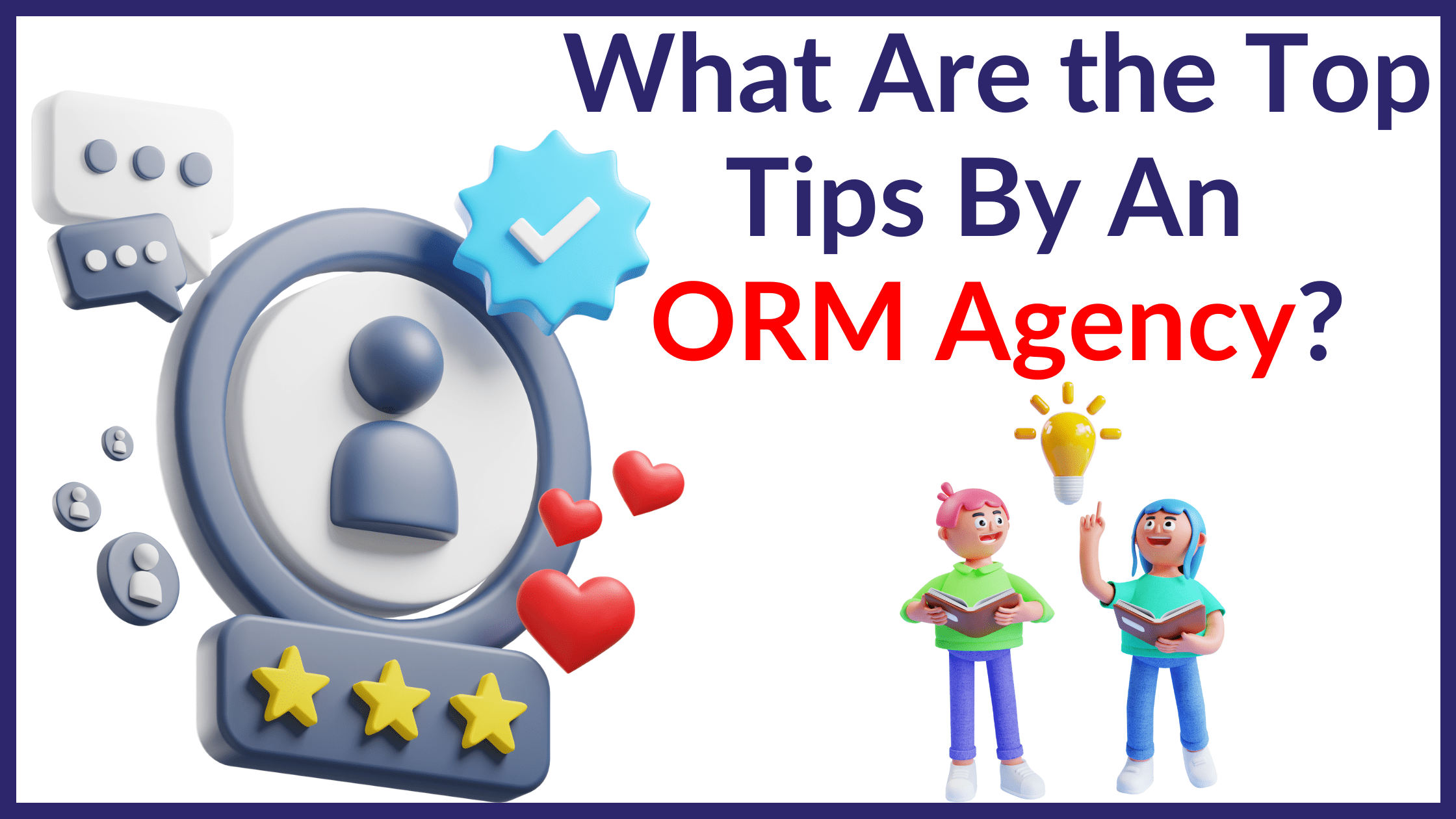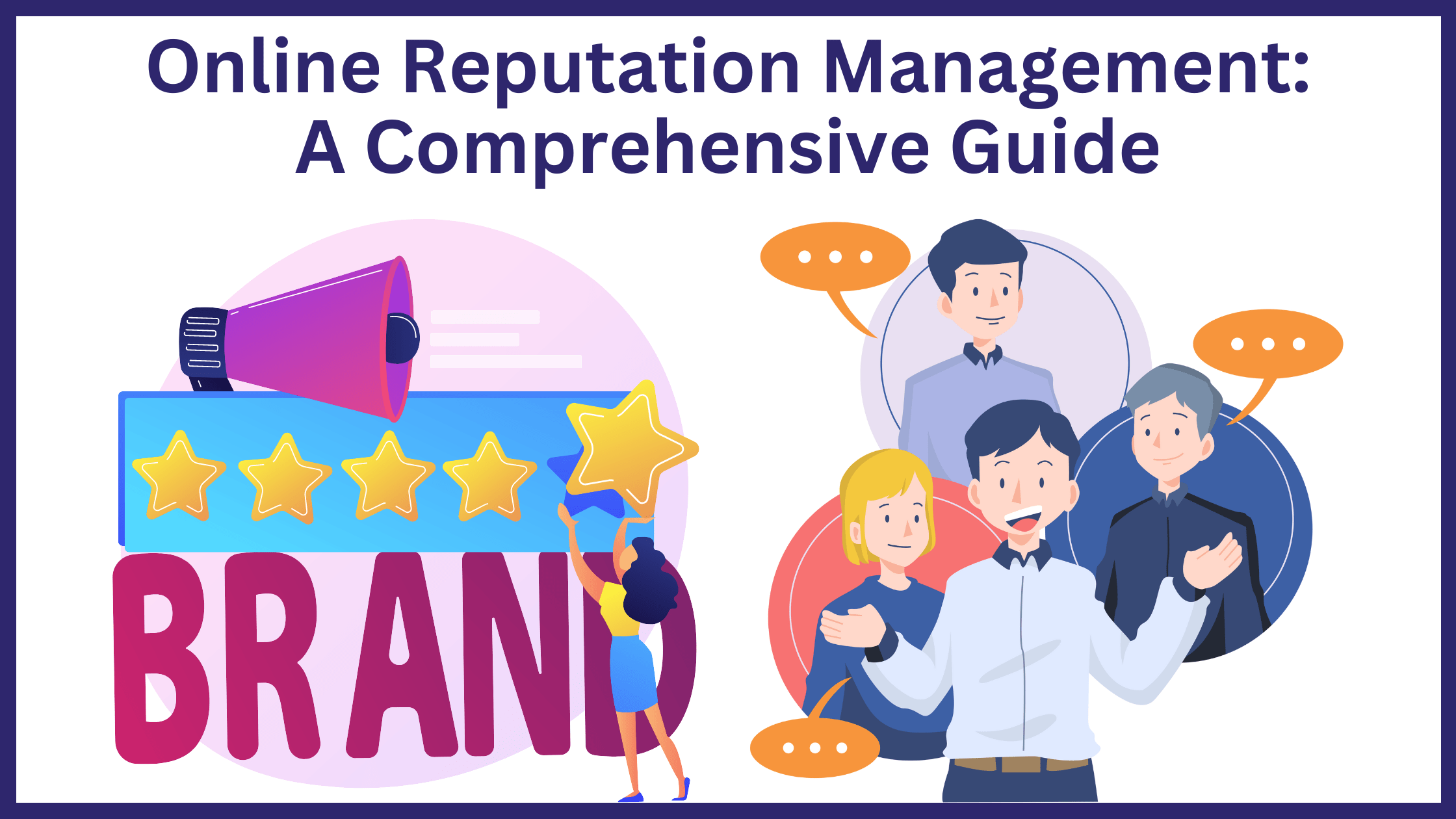

The internet was quite different only a few years ago. People could not effectively express themselves, and the overall communication landscape was dominated by “top-down” communication. Companies did not engage with customers; instead, they sold (or attempted to sell) to a receptive audience.
The situation has taken a dramatic turn. Websites are no longer just brochures with static content. It’s imperative to include user-generated content. Regular interactions on social media are also critical to the success of any business.
People, including prospects, customers, clients, and their friends, are talking about you, regardless of the size of your company. They’re tweeting about your new product, leaving comments on your blog, updating their Facebook status about their customer service experience, and much more.
A plan for managing your online reputation before a problem arises is crucial to reducing the impact of negative reviews. If you strategize the right ORM services in India, your organization may be better equipped to respond quickly and efficiently to reduce financial loss.
Table of Contents
Understanding Online Reputation Management And How Does It Work
Online reputation management (ORM) combines public relations, digital marketing, and SEO strategies that you can use to protect and maintain your online image. ORM is a powerful tool for boosting positive photos, news, and statements about you or your company on the internet.
Managing product and service searches in the digital space becomes easy with the right ORM services. “Online reputation management” entails monitoring an individual’s online reputation or the online reputation of a company. This includes focusing on social media platforms such as YouTube, Instagram, and Facebook, addressing potentially harmful content, and utilizing customer feedback to help solve problems before harming the brand’s or individual’s reputation.
In response to the story’s content, you could, for example, issue a public statement or make a social media post.
Is It True That Managing Your Online Reputation Has An Impact On Your Business?
When people search for or come across your company online, their perception of it is influenced by your online reputation. As a result, online reputation management (ORM) has a positive impact on what people find online.
For example, you can push undesired and harmful information down Google’s search engine results pages by posting more desirable content from your own or third-party sources above it (SERPs). Because the top five search results on Google receive over two-thirds of all clicks.
However, ORM services encompass more than just content management in search engines. It’s also about responding to negative feedback and encouraging satisfied customers to leave more positive feedback.
Channels For Online Reputation Management
The four digital marketing channels that are used in ORM, also known as the PESO Model, are listed below.
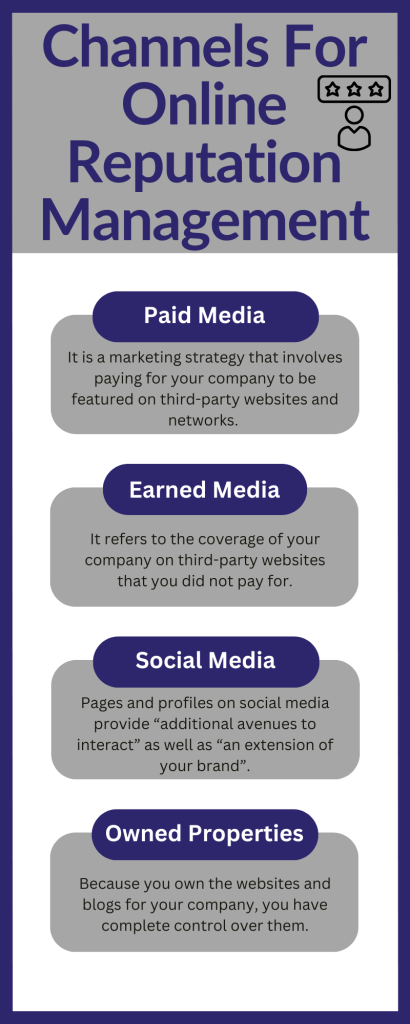

1. Paid Media
Paid media refers to all marketing efforts that entail paying to have your business featured on third-party websites and networks. It increases your reach and traffic to your web properties, in addition to establishing new relationships with partners and customers.
2. Earned Media
The coverage of your company on third-party websites that you did not pay for is referred to as earned media. You must stand out from the crowd by providing excellent content, products, or services that users will share, mention, repost, or review.
3. Social Media
“Additional avenues for people to interact” and “an extension of your brand” are created by pages and profiles on social media. It’s vital to commit the time and resources necessary to stay active on social media properties by participating in conversations and consistently releasing fresh information. As a general rule, it’s preferable not to have a profile on a network than to have an inactive one.
4. Owned Properties
You have complete control over your business’s websites and blogs because you own them. Naturally, the more properties you own, the better your chances of successfully establishing your digital presence. Also, you wouldn’t want to create confusion by defining properties that aren’t distinguishable.
Differentiating Between Public Relations And Reputation Management
Both online reputation management (ORM) and public relations (PR) aim to present a positive image of the company. The most significant distinction between the two is how they achieve their goals.
For example, public relations firms advertise and coordinate media promotions outside. It’s primarily a proactive effort to strengthen brands rather than a reactive attempt to mitigate attacks on businesses (though PR firms do occasionally handle damage control).
Furthermore, managing one’s online reputation is often a reactive process. It entails scouring the internet for potentially harmful content created by other people or businesses, as well as responding to it.
Brands handle it with the best ORM company, which strategizes and maintains your online reputation.
Understanding The Difference Between Online Reputation Management And Search Engine Optimization
You must have heard about search engine optimization if you own or manage a business (or SEO). SEO is a technique for enhancing the visibility of a web page, website, or online content in search results. Regrettably, some business owners equate SEO with online reputation management. Although certain aspects of SEO and ORM overlap, there are critical differences between the two that every business owner should be aware of.
The primary goal of SEO is to improve the visibility of your website in search results in order to increase the quantity and quality of visitors to your website. Although SEO is an integral part of an ORM strategy, it is only a minor part of online reputation management. On the other hand, ORM extends beyond just ranking first in search results for a specific term to ensuring that your additional online information is up to date.
It may be helpful to study why ORM is so important to comprehend the distinctions between SEO and ORM better.
What Factors Affect Your Online Presence?
If you’re unsure what your ORM techniques should be, it’s good to understand what factors influence your online reputation. The following elements will have an impact on your internet reputation:
- On review sites, your reviews and overall ratings count.
- On social media, what are people saying about you, your business, or your products?
- What are your strategies for dealing with both positive and negative feedback?
- Whether or not your web presence is up to date and active.
- Each of these variables is pretty diverse. Managing even a single aspect, like reviews, necessitates a variety of tasks and continual upkeep. As you may expect, the more control you have on each factor, the longer and more expensive ORM becomes.
Individually, you may not need to be concerned about online reviews or ratings; instead, you may choose to concentrate just on search results. Regardless, the strategy and tools you use to manage your online reputation should be tailored to your specific scenario and goals.
What Makes Managing Your Online Reputation So Important?
A brand can take a lot of flak online, but the majority of them are minor—a bad review here, a low star rating there. Despite the fact that none of these setbacks are significant enough to justify a full-fledged public relations campaign, they add up.
To put out each of these minor fires before they become major problems, you’ll need online reputation management. ORM will be critical in 2022 for maintaining transparency, which is a key component of brand loyalty. This is why one should connect with the right ORM company to plan their next moves.
While well-planned public relations campaigns have their place, today’s customers prefer more natural interactions with companies. They want businesses to send them personalized messages, such as an Instagram comment or a direct message.
Negative claims are addressed directly and openly with online reputation management, which aids your company in defending itself.
The Use Of Online Reputation Management Has Several Advantages:
1. It Generates More Revenue
Many people conduct online research before buying a product or service. Before making a purchase, they read online reviews to see what others have to say about a company’s products and services.
Positive internet reviews increase the likelihood of customers patronizing a business. Companies with a bad reputation or a lot of bad reviews lose out on a lot of money and opportunities. That is why the ORM agency should be consulted to strive for positive online feedback.
2. Brand Development Is Aided By It
When negative information about a company is spread on the internet, the loyalty of its customers is usually ruined. As a result, the company’s performance may be negatively affected. In the blink of an eye, they could lose the respect they’ve earned over time.
An efficient online reputation management approach, on the other hand, can aid in the development of a company’s brand image. Companies may create the image they want by regularly tracking reactions on their communication channels.
3. Enhances Visibility
Having an online presence necessitates the creation of a well-designed, content-rich website or company blog. These websites are then integrated into social media sites such as Facebook, Twitter, and YouTube. Each of these platforms is a potent marketing tool in its own right.
They do, however, necessitate adequate management in order to deal with day-to-day user activities. Using the services of an ORM agency is the best way to manage these regular user behaviors.
4. Refrain From Spreading Rumors
Spreading rumors about a company is a type of black-marketing tactic used by competitors. There are also times when personal opinions or a singular experience start rumors.
Rumors are quickly picked up by the market and disseminated in all directions without regard for boundaries. Rumors have the power to destabilize a well-known brand. One of the basic features and benefits of the ORM company is that it keeps rumors at bay. People prefer to hear negative news over positive news. ORM excels at keeping track of rumors and providing prompt responses. This preserves the brand’s image.
The world has become obsessed with social media and other digital platforms, while everyday life has devolved into a struggle for survival. Brands have extensively exploited this modern trend. They have a lot on the line because people can create and destroy with the touch of a 6-inch screen.
With this in mind, protecting your brand from the wrath of both angry customers and fraudsters is essential. ORM (Online Reputation Management) comes into play here.
These guys aren’t exactly public relations, but they do a fantastic job of maintaining your brand’s image while also keeping your customers’ trust.
5. The Credibility Of The Market Is Unaffected
People’s perceptions of your brand are what determines its marketing credibility. It takes years to build a brand, but it only takes minutes to destroy it. The job of The goal of online reputation management is to prevent a brand’s reputation from being harmed by market events!
This perception can be skewed negatively, but an active ORM prevents this. It assists you in dealing with negative sentiments as well as negative comments to maintain your credibility. The ORM agency helps brands return from the brink of oblivion during those times, preserving their credibility.
6. It Provides Useful Business Information
An effective online digital reputation management strategy can reveal useful information about how to raise brand awareness. Each review is significant because, if targeted correctly, it may be a powerful tool for attracting new customers.
The reviews give businesses feedback that can help them improve their operations and even plan for the future, which is especially useful when launching a new product or service. Even if an unfavorable review is received, reputation managers can respond by rectifying the problems.
Once you start working on this, you will realize how fruitful results you can get when you follow the Tips To Improve Online Reputation Management.
7. Customers Who Have Expressed Dissatisfaction Have Been Appeased
As long as there are irate customers, there will always be bumps in the road. But isn’t it true that nothing works the way you want it to? You don’t want customers ranting about their bad experiences with your company on every digital platform available.
It’s like quicksand when it comes to the negative sentiment on social media. If you own a big business that sells small items or fast-moving consumer goods, you’ll have a lot of angry customers.
Online reputation management, on the other hand, benefits the customer by giving prompt responses and appropriate resolutions!
8. Increased Audience Participation
Finally, your audience engagement will improve once you begin managing your online response. People prefer brands that connect with them, and ORM makes sure that happens! ORM is in charge of both the compliments and positive feedback and the concerns and complaints.
People don’t feel they’re interacting with a real person through online reputation management when interacting with a brand. This gives your brand more personality and allows you to break into new markets.
What Criteria Should Be Used To Select Online Reputation Management Firms?
A reputation management organization provides services to individuals and businesses, including SEO, content production, social media content creation, website acquisition, administration, and third-party monitoring. And if your brand is distinct, so must be your reputation management strategy.
When selecting online reputation management businesses to manage your personal or corporate reputation, you must evaluate aspects such as your budget, desired features, and customer service quality.
The first stage is to assess your present reputation compared to your ideal image. Are you attempting to restore a damaged internet reputation, maintain an existing one, or establish a brand-new one? Which platforms would you like some help managing? Perhaps your website needs to be redesigned, your social media platform needs to be upgraded, or your business needs more reviews.
After you’ve outlined the duties you’d like an online reputation management business to complete for you, look for organizations that specialize in these areas that are credible and trustworthy.
How Does ORM Fit Into Digital Marketing?
The goal of online reputation management services is to monitor and improve your online reputation. You must have a significant internet presence to engage potential customers.
The internet reputation and public image of a company can significantly impact its growth. ORM, or online reputation management, is an important part of any marketing strategy because it tracks and analyzes a company’s online reputation.
ORM aids in the creation and maintenance of a positive brand image in digital marketing. Critical attacks on your reputation can be easily averted and their impact reduced.
What Does Online Reputation Management Usually Entail?
Online reputation management includes marketing, public relations, SEO, and consumer engagement. ORM comprises, at a bare minimum, keeping track of one’s online presence and attempting to exert influence over what shows in search results.
This can range from a job prospect setting up a Google Alert and editing their LinkedIn profile to firms executing elaborate operations to produce reviews across many internet channels.
Manage Your Online Reputation
A financial and time commitment is required to establish your online reputation. Unfortunately, many small businesses do not prioritize reputation management until there is a problem that must be addressed.
Any modern digital marketing strategy should include proactive online reputation management as a key component. If you lack the appropriate knowledge, managing your company’s reputation on your own can be difficult, time-consuming, and potentially alienate your customers. If you don’t have the time, don’t know where to begin, or simply aren’t seeing the results you want, consider hiring someone to manage your online reputation.
Final Thoughts
Building and managing your online reputation entails actively influencing how customers perceive your company.
Online reputation management has the potential to transform your company! The four digital marketing platforms that help shape your online reputation are paid media, earned media, owned properties, and, most crucially, social media. Many tools are available to assist with everyday duties, such as content production and sticking to a publication schedule on social media. Remember to have a social media policy and content plan in place.
Online reputation management systems can also be used by businesses to research, monitor, and respond to online reviews. It allows you to search for your company’s evaluations and then reply appropriately to any negative feedback you uncover.




